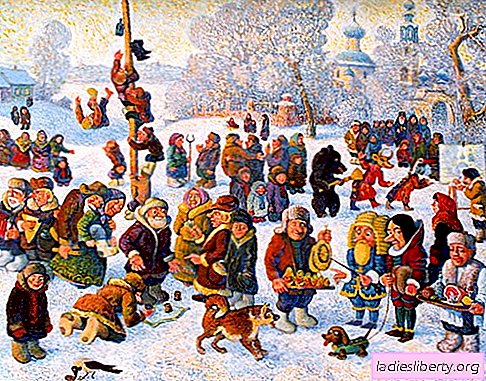
Holidays January 10
Memorial Day 20 thousand sufferers
On this day, the eastern peasants celebrate the Day of Remembrance of the Martyrs. The history of this holiday is very old and very interesting. In the fourth century, the ruling emperor Maximilian ordered his subjects to destroy all Christian churches and burn religious books. At that terrible time, Christians were persecuted, and were deprived of all civil rights. Then in the city Bishop Cyril read sermons, he ensured that all the dignitaries of the emperor accepted the Christian faith, but this was done in secret. In the palace of the emperor lived the pagan priestess of Domna. When she read the Epistles of the Apostle Paul, her interest in Christianity arose. In secret from everyone, she came to Cyril, and he christened her. After that, the former pagan began to help the poor with joy, distributed alms and fed them directly from the imperial table. Soon the chief of the eunuchs found out about this, he was very loyal to the emperor, imprisoned Domnu together with his servant in prison. The prisoners ate only spiritual food; they were not brought food at all. Domna pretended to be crazy, and she was kicked out of the palace. Then the girl settled in the convent, but knew that they would certainly look for her. The abbess cut the girl's hair and gave her men's clothing. In this form, Domna left the monastery, but the imperial warriors still defeated the Christian monastery. One day the emperor made a sacrifice in the main square of the city. At the moment the crowd was sprinkled with blood, people of the Christian faith began to leave the square. Seeing this, Maximilian was angry, at that moment an earthquake began. In the year 302, during the celebration of Christmas, more than twenty thousand people of the Christian faith prayed in the Nicodemia church. The cruel emperor ordered everyone to leave his church and make sacrifices. However, everyone refused to do so. The emperor ordered the church to be burned, along with the people. At this time, Domna was hiding in a cave, learning about this terrible mountain, the girl came to the city and wept bitterly at the conflagration. Soon the imperial warriors killed the girl with a painful death.
Day 110 in Japan
Every day, this number receives a huge number of calls. 110 is the Hyatu Toban Police Service Number. According to statistics, every five seconds there is one call. This means that every fifteenth resident of Japan tries to call this number, and thereby inform law enforcement defenders about various incidents, or asks for help and protection of professionals who work in the police. This day is the official holiday of 110 service. This number is present on all telephone booths in the city, also any child knows it. Numbers 110 is an extreme number for dialing into the police. In Japan, this number began to work in 1948 to assist citizens. At first it was used by the largest cities: Osaka, Kobe, Nagoya, Fukuose. Initially, they made two numbers, the difference was 110 and 1110 in one digit, and on July 1, 1954, they introduced a new police law, after its promulgation, the authorities decided to make one number - 110. They chose this number because it is easy to remember, difficult make a mistake when dialing this number, on the phone’s disk the number one is located closest. This number receives signals of different contents. Residents can report about a broken shop window, a car accident, about a robbery. Sometimes false calls from hooligans also come to the service. If the line is very busy, the answering machine is triggered, the caller is asked to wait a bit. In this case, do not hang up, because your call will go to the last place on hold, and you will spend more time to connect with the operator, and this is absolutely unacceptable, because emergency help is needed as quickly as possible.
Opening day of the first session of the UN General Assembly
The first installation session of the UN General Assembly began its work in London on January 10, 1946. This memorable date coincides with the date of the 26th anniversary of the League of Nations, this is a worldwide movement for peace and ecumenism between all nations, founded in 1920 and dissolved in 1946. His assets and all liabilities were transferred to the UN. In 1945, in accordance with the UN Charter, they established the UN General Assembly. Initially, this is the main deliberative legislative and representative body of the UN. One of the main goals of the General Assembly is the process of establishing and codifying international law. The first installation session featured official representatives of 51 states. Now in the structure of the General Assembly are 192 states that are members of the UN. The General Assembly is on duty every year from September to December. When questions arise that need to be addressed immediately, emergency sessions are convened. At recent meetings, the General Assembly vigorously discussed issues related to resolving global problems. According to members of the General Assembly, there are two of the most serious problems, the first is an unexpected change in the Earth’s climate, and the second is the global financial and economic crisis. The adverse consequences of these phenomena pose a threat to all of humanity, and must be resolved as soon as possible.
Voodoo Festival in Benin
On January 10, the state of Benin announced that they would celebrate the feast of witchcraft - Voodoo. Since then, every year the state holds the Voodoo Festival. They hold a festival to prove that the oldest beliefs are not at all as terrible as they are thought to be. Many people consider Voodoo delirium. This is due to different stories of dark rituals killing people from a distance, when dark sorcerers prick the dolls with their needles, which represent the victims. The Voodoo cult came from the beliefs of some tribes of Benin and Nigeria. The word "Voodoo" in translation from the language of one of the tribe means "soul." Throughout history, this pagan cult has its own so-called fathers and mother superior. The most famous abbess, or Queen of Voodoo, is Mary Lavaux, it is believed that her spirit will not leave New Orleans, as long as the city stands. In modern times, people come to her grave, there is a legend: you need to put three crosses on a white tombstone with a red brick, and rub your knee against it, it is believed that Mary’s spirit will fulfill her wish. It was said that Mary very skillfully prepared the main dishes of the Voodoo cuisine - Ru and Gambo. Fans of Voodoo to this day use her recipes. For this holiday, organized in the port city of Kila, tens of thousands of participants and just spectators gather, people come from America, Europe and Asia. Adherents of various Voodoo sects are located on a soft sandy beach. Each sect unfolds its own tent, in it they sacrifice a rooster and perform ceremonies and rituals, and newcomers join the fraternity. There are many sorcerers in Benin, from there this cult passed to the USA and became known thanks to the work of some writers. Tourists from all over the world who love everything magical seek to get into this country in order to see the "spirit" of Voodoo with their own eyes.
January 10 in the folk calendar
Christmas Carnivore
Household day was not considered a public holiday, it was from this day that a long period of a certain lifestyle of Orthodox peasants began, at which time only meat dishes could be eaten. This custom was connected with the fact that in the beginning of January it was customary to slaughter livestock. Therefore, meat was prepared on the table, primarily pork. However, nobody canceled the weekly post; it was on Wednesdays and Fridays. The peasants said that meat should be eaten as a meat-eater, and lean meat should be its turn. According to tradition, the time for weddings began at this time. Because it was in Meat-Eater that a rich table could be laid. The Christmas carnivore lasted a long time, so there was plenty of time for fun wedding ceremonies and feasts. This period was popularly called Household Day. It was customary for the whole family to gather in the house, to do housework together, and to sit at the table together. This day was reminded to people that consent in the family is the most expensive thing that can be in a person’s life. The peasants said, when the family is in harmony, then any matter is argued, and wealth will be born. There was a custom before this day. Near each village was Red Hill, people brought stakes there, and drove them well into the ground. Entire families came to this hill in the morning, each member of the family tied a patch of cloth to the stake, and made a wish. On Household day, celebratory celebrations still continued. Peasants invited guests home, and played various fun games. On this day, paid attention to the weather. They said that if frost falls on the ricks on January 10, you need to wait for the rainy summer.
Historical events of January 10
1863 year the world's first subway line opened in London
In London, opened the world's first underground - the oldest on Earth. In 1863, the Metropolitan Railway, built the first branch of the underground railway. The length of the first line did not exceed four kilometers. The line served seven stations. The first subway trains were steam-powered cars. The locomotives operated on coal fuel and in a practical sense were very uncomfortable, since soot from coal smoked the stations and tunnels of the subway. In addition, passengers from soot were literally covered in soot, and the air in the tunnels and wagons was, to put it mildly, not quite clean. But, despite all the amenities, the new mode of transport was very popular. Firstly, the metro could quickly get to other areas of the city, and secondly, it was interesting and somewhat extreme. On the day the metro was put into operation, almost 30 thousand residents of London swept the new transport. The metro in the capital of Great Britain is one of the oldest and largest in the world. Today, the London Underground annually carries about 1 billion passengers. The length of the metro lines reaches five hundred kilometers. Underground lines connect with the London Railway and the light, shallow subway. The entire British capital is permeated with subway lines, thanks to this the center and outskirts are perfectly connected and perfectly interact with each other.
1920 year League of Nations was created
In January 1920, for the first time, the League of Nations gathered, a kind of prototype of the UN. The organization was founded according to the principles of the Versailles Peace: reduction of armaments, prevention of conflicts with the use of weapons, organization of collective security, raising the standard of living of the peoples inhabiting the Earth. At the first stage, the organization included 44 states, in the future the number of participating countries expanded to 63 countries. However, the leading world powers of the United States and Russia have not ratified this agreement. By the way, Russia was not invited to the new organization at all. In the first years of its existence, the League of Nations was able to fulfill its main tasks and destinations, but by the mid-30s, the organization had a structural crisis, and the League of Nations began to lose its position on the international stage. In the 1930s, Japan, the founder of the League of Nations, invaded China and captured a huge part of China. No directives and resolutions of the League of Nations affected the Japanese leadership. In addition, in the month of March in 1933, Japan withdrew from the League of Nations. The organization did not have mechanisms that could really influence states that violated international law. Following Japan, Germany left the organization. In 1935, Italy occupied Ethiopia, both states were members of the League of Nations. All the League of Nations could do was condemn the aggressor and promulgate a resolution. Soon, the collapse of the organization took place on the principle of falling dominoes, and by 1946 the League of Nations ceased to exist. Her assets were transferred to the UN. The United Nations, took into account the experience and mistakes, in the activities of the League of Nations, as a result of which a powerful international organization was created with effective means and mechanisms for resolving international relations.
1972 year tram crash in Lviv
The disaster occurred on January 10, 1972 in Lviv. It is the largest tram disaster in the history of Lviv. As you know, tram lines in Lviv run in the middle of the street, and stops are located on the so-called security islands, right at the tracks. The stopping area was fenced with borders. On this day, in the morning on the street Gorodetskaya, a crowded tram raced along the rails. In the middle of the descent, it became clear that the tram driver fell asleep and the carriage became uncontrollable. When the tram approached the intersection of Gorodetskaya and Shevchenko streets, according to the rules, the driver had to slow down, but he was asleep, and the car went off the rail and crashed into the mass of people waiting at the bus stop. After passing the stop, the tram broke the wall of a nearby school. The incident killed twenty-six people. That same evening, Voice of America announced the tragedy. To the last, the Soviet mass media kept silent about the fact of the catastrophe. However, the Lviv local newspaper Vilna Ukraine, reported the tragedy on one of the pages of the publication. The Lviv newspaper reported on the tragedy and expressed deep and sincere condolences on the victims. After the incident, the selection of candidates for tram drivers was tightened. In addition, tram stops were converted.
1966 yearadopted Tashkent Declaration
An interstate diplomatic agreement signed by the President of Pakistan and the Prime Minister of India. The agreement was signed in the presence of the Chairman of the Council of Ministers of the USSR A.N. Kosygin. The meeting between President Ayub Khan and Shastri was initiated by the Soviet government as part of a project to resolve the armed conflict between India and Pakistan. The meeting was held in a decorated atmosphere, but the Soviet side did everything possible to soften and pacify the atmosphere of negotiations. By the end of the meeting, the leaders of India and Pakistan were able to find common ground in resolving controversial issues. The signed agreement provided for the implementation of measures to eliminate the devastating consequences of armed conflict. The parties agreed to withdraw their military formations to their previous positions, restore full diplomatic relations, as well as resume cultural and economic ties. The principles laid down in the declaration brought relations between the two countries to a completely new diplomatic level. However, the agreement was one of many attempts to resolve the bilateral conflict. Soon, the signed peace petitions were maliciously violated by both countries, which ultimately resulted in a new armed conflict. To date, the contradictions between the countries are not resolved and are in a "frozen" state.
Born on January 10
Alexey Tolstoy (1883-1945), Russian writer
Tolstoy was born in January 1883, in the Saratov province, in a noble family. At a young age, Alexei's parents divorced, and the mother and the boy went to A. Bastrom. The writer’s childhood passed in the estate of his stepfather in the village of Sosnovka. The boy received primary education at home, where he was trained by a private tutor. In 1897, the Tolstoy family moved to live in Samara.Here Tolstoy went to study at the gymnasium, after graduation, by which he was sent to study in St. Petersburg. At this time, he writes his first poems, though the style of their writing is somewhat reminiscent of the manner of Nekrasov. Since 1907, the writer begins his literary work. Soon his first books, Beyond the Blue Rivers and Magpies Tales, were published. In the early works of Tolstoy, one can also notice the influence of the writer Voloshin. In 1909, Tolstoy wrote his first successful novel, "A Week in Turgenev." Then two novels were written, "Eccentrics" and "Lame Barin." In the First World War, the writer works as a war correspondent, regularly goes to the front lines. During this period, he writes a number of stories and essays about the war. Then he writes comedic novels "Unclean Force" and "Killer Whale." Alexei Tolstoy did not accept the Bolshevik revolution and was forced to emigrate to Germany. In Berlin, Tolstoy writes the novels Aelita, Black Friday, and The Manuscript Found Under the Bed. In the twenty-third year, Tolstoy nevertheless returned to the USSR and soon published his famous trilogy "Walking through the agony." The outstanding work of Tolstoy is undoubtedly the novel "Peter I", which the writer wrote for almost 16 years. During the Great Patriotic War, Tolstoy "toured" on the fronts, read articles, essays, and stories. During the war, Alexei Tolstoy creates the dramatic play "Ivan the Terrible." Many works of Tolstoy are recreated on the screen.
Valentina Telichkina (1945 ...), Russian actress
The actress was born on January 10, 1945 in the Gorky region. Parents Valya was a late child. Before the birth of his daughter, Vali's father, was dispossessed and arrested, all the property of the family was confiscated. Fortunately, my father was soon released, but the family began to beggar. The girl from childhood showed acting data. Already in kindergarten and school, the girl participated in amateur groups and performances. Valya also independently led three circles at school: dance, drama and art. After school, the girl enters VGIK and graduates in 1967. In the movie, Telichkina made her debut as a student, starring in the film "Taiga Landing". Then she played the courier in the movie "Journalist". After graduating from VGIK, the actress began to actively act in films: "Autumn Weddings", "Beginning", "Unusual Exhibition". Thanks to these paintings, the actress became famous and recognizable. In 1976, she was awarded the title of Honored Artist. For the role of Anna, in the film "Vassa", the actress was awarded a state prize. In the 90s, Telichkina practically did not act in films, according to her, the cinema of that period absolutely contradicted the moral worldviews of the actress. In our time, the actress starred in several, according to her, worthy tapes and series.
Robert Wilson (1936 ...), outstanding physicist
Robert was born on January 10, 1936 in the United States. Graduates from Rice University. He graduated from a postgraduate study at a technological university. In 1960, a group of scientists led by Wilson and Penzias built a reflective antenna to receive signals from the Echo satellite. After the antenna reaches its goal, it was converted into a radio telescope. The main task of the astronomical radio telescope was to search and register extraterrestrial information sources. Wilson created a special switch, capable of connecting the telescopic antenna and control sources, to differentiate the noise coming from outer space. In 1964, scientists Wilson and Penzias were able to measure the signals of Cassiopeia. As you know, the constellation Cassiopeia was formed as a result of the explosion of a giant star. Researchers were surprised to find that one hundred levels of background noise exceeded expected values. After eliminating all kinds of sources of noise on the antenna, noise from space had to be recognized by relict radiation. Wilson's discovery has indirectly confirmed the big bang theory. In 1978, researchers Wilson and Penzias were awarded the Nobel Prize for the discovery of microwave relic radiation. However, opponents of this discovery do not believe that the data obtained by Wilson clearly indicate the truth of the Big Bang theory and that the very concept of the Big Bang is a poorly substantiated theory of the origin of the Earth.
Boris Wojciechowski (1954 ...), Russian actor and director
Boris Wojciechowski was born on January 10, 1954. After graduating from the theater institute, Boris works as a director at the children's philharmonic in St. Petersburg. The young director staged professional and colorful children's performances. At the Vremya Theater, Wojciechowski staged the famous children's play Three Piglets. Engaged in directing, Wojciechowski managed to engage in teaching activities at LGITMiK. His students were pop artists Burmistrov, Shumilov and
Korosteleva, as well as a number of contemporary artists. Since 2004, Boris Dmitrievich has been working in Moscow, where he directs productions of the comedy show "Crooked Mirror". In addition to directing and teaching, Wojciechowski starred in the movie. Boris Dmitrievich is endowed with the talent of a tragicomic actor, in addition, he has a colorful textured appearance, all this attracts the eyes of young directors and producers. For the first time Wojciechowski starred in the movie in 1984, in the movie "My Friend Ivan Lapshin." In the picture, Wojciechowski starred with outstanding artists, Andrei Mironov and Nina Ruslanova. Further, the master starred in the films "The Gardener" and "Taurus", however, these tapes were left unnoticed by the audience. Recently, Wojciechowski has been particularly active in films, his last relatively successful works are films, "Despicable Swans" and "Convoy PQ-17." The master has many plans for the future, he dreams of staging grandiose theatrical performances and creating thematic historical paintings, in which he plans to act himself.
Name day 10 january
Alexander, Dominica, Efim, Arkady, Peter











